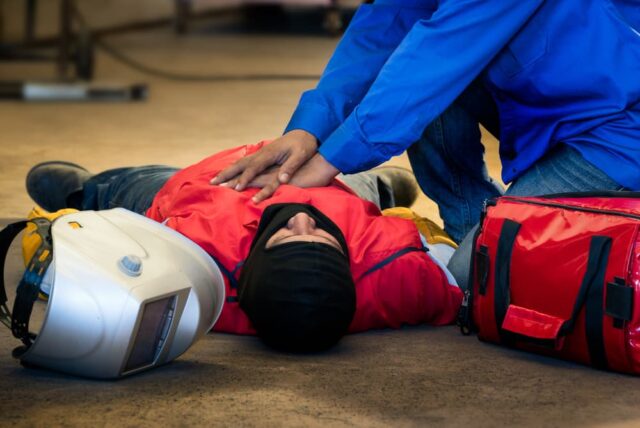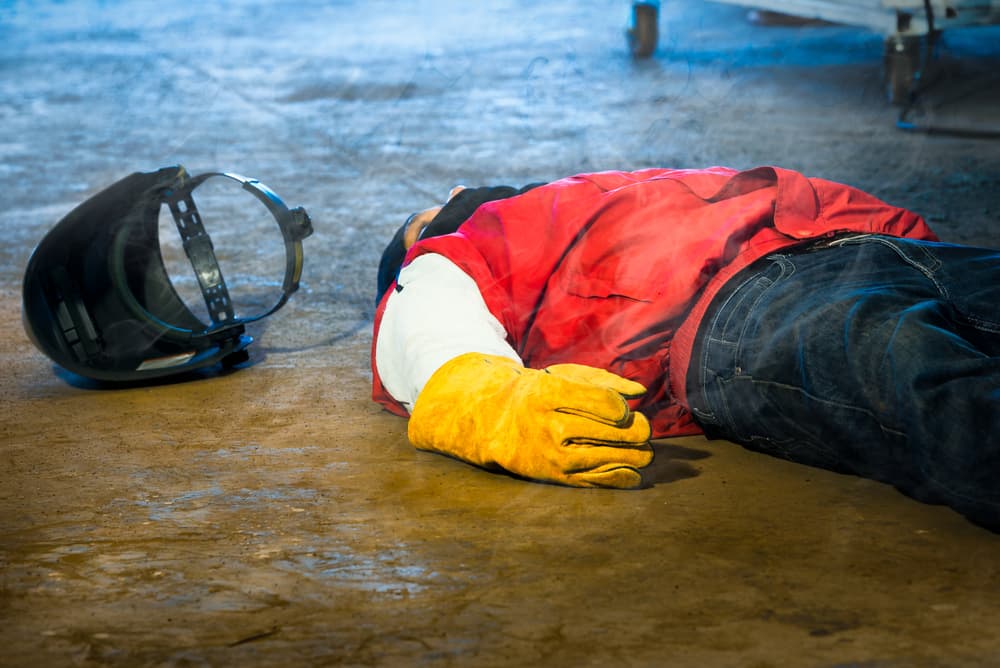When a worker loses their life due to unsafe working conditions, negligence, or misconduct, multiple parties may be held liable for the wrongful death. Employers have a legal responsibility to provide a safe work environment, but in some cases, third parties such as equipment manufacturers, contractors, or property owners may also be responsible. Identifying all liable parties is vital to ensuring justice and securing compensation for the victim’s family.
If you have lost a loved one due to a workplace accident, you do not have to navigate this difficult time alone. Understanding your rights and determining liability can be complex, but an experienced attorney can fight for the compensation and accountability your family deserves. Contact a Rogers wrongful death attorney today to discuss your case and explore your legal options.
Wrongful Death Law
 Many states allow certain family members to sue for compensation after a loved one dies in an accident caused by the negligence of another person or entity. Wrongful death law helps families recover some sort of normalcy, even though receiving financial compensation cannot make all things right after a loss.
Many states allow certain family members to sue for compensation after a loved one dies in an accident caused by the negligence of another person or entity. Wrongful death law helps families recover some sort of normalcy, even though receiving financial compensation cannot make all things right after a loss.
Most states only allow certain individuals to bring a wrongful death lawsuit. Here are examples of who may sue for wrongful death:
- A surviving spouse and children
- Parents if the deceased was an unmarried child
- Personal representative of the estate
- Other dependents or financially affected individuals
Wrongful death law and filing a lawsuit for damages can get complicated. An experienced attorney can handle the legal process and get your family the recovery that you deserve.
Common Issues In Workplace Wrongful Death Accidents
Workplace wrongful death accidents often stem from negligence, unsafe conditions, or violations of safety regulations. Here are some common issues that lead to these tragic incidents:
Lack of Proper Safety Measures
Lack of proper safety measures can lead to serious, even fatal, workplace accidents. An employer’s failure to provide protective gear (i.e., gloves, helmets, harnesses, etc.) and lack of safety training for employees can increase the odds of a workplace accident. Some employers ignore OSHA safety regulations and industry safety standards, putting their employees at risk of injury or death.
Hazardous Work Environments
Workplace environments that are hazardous can lead to deadly accidents. Falls from heights, exposure to toxic substances, and unguarded heavy machinery can be a deadly combination in the workplace.
Employer or Third-Party Negligence
A wrongful death workplace accident can happen if the employer forces workers into unsafe conditions to meet deadlines. Employers who engage in negligent hiring (meaning hiring unqualified workers operating dangerous equipment, for example) and contractors or subcontractors who fail to follow safety rules might place legal liability on the deceased’s employer.
Defective Equipment or Machinery
Deadly workplace accidents often happen when employers use faulty tools or equipment malfunctions that lead to fatal accidents. An employer’s failure to perform routine maintenance or inspections can also lead to serious accidents.
Workplace Vehicle Accidents
Truck crashes are common in transportation and delivery jobs. Forklift or heavy equipment accidents can lead to a deadly accident. If evidence of a negligent employer exists, an attorney can find it and use it to get your family full and fair financial compensation after losing someone in an accident.
Lack of Emergency Response Plans
Employers are responsible for ensuring that the workplace has an emergency response plan. Lack of first aid or medical response plans can contribute to a deadly accident. Failure to address known hazards before an accident occurs creates legal liability for the employer. An attorney can get what you deserve after losing a loved one in an accident that occurred in their workplace.
Who Shares Responsibility for Causing a Workplace Accident?
Responsibility for a workplace accident can fall on multiple parties, depending on the circumstances. Here are the key players who may share liability:
Employer
The most obvious defendant in wrongful death workplace accidents is the deceased’s employer. A failure to maintain a safe work environment, inadequate training or improper supervision, and failure to provide proper safety equipment can all place legal liability on the employer.
Employee
The employee’s co-workers might be to blame for the accident and can face legal consequences for their actions. If the worker violated safety protocols or acted negligently, they might share some responsibility. A co-worker can be at fault if they caused the accident through recklessness or misconduct.
Property Owner (If Different from Employer)
If the accident happened on someone else’s property due to unsafe conditions, the property owner might be liable under premises liability laws.
Equipment Manufacturers
Depending on the industry, poorly made heavy machinery could have been the cause of the deadly accident. If faulty machinery, defective tools, or unsafe equipment contributed to the accident, the manufacturer may be held responsible for a product liability claim.
Contractors or Subcontractors
It is important to investigate the facts of an accident to discover all potential defendants. If a third-party contractor caused the accident (i.e., unsafe worksite practices), they can be liable instead of the direct employer. An attorney can help you understand who is liable after a workplace wrongful death accident.
Government Entities
In some cases, a government entity is responsible for causing the fatal workplace accident. If the accident happened on a public road or on a public worksite (i.e., a roadwork or government-owned building), a government agency might share responsibility for the accident.
Despite whom might be at fault or who might share fault for a wrongful death accident, an attorney can help your family discover who owes you compensation. Do not hesitate to contact an experienced wrongful death lawyer after losing someone in a workplace accident.
What Compensation Is Available After a Wrongful Death Accident?
In a wrongful death case, compensation (also called damages) can cover both financial losses and emotional suffering. The exact amount depends on the state laws and details of the case, but here is what may be available:
Economic Damages
Economic damages include the physical losses that incur after a wrongful death accident. Economic damages are usually easy to quantify, but it is still best to work with an attorney to ensure that you pursue all the compensation that you might be entitled to. These damages cover the direct monetary impact of losing your loved one, including the following:
- Medical expenses related to the injury before death
- Funeral and burial costs
- Loss of income and financial support (what they would have earned over their lifetime)
- Loss of benefits (i.e., health insurance, retirement contributions, etc.)
- Loss of inheritance (if their death affected future assets)
Non-Economic Damages
Non-economic damages might be available after a wrongful death accident. Non-economic damages include intangible losses that are usually hard to quantify. Working with an attorney can help your family get the financial compensation that you need to monetarily recover after losing someone in a wrongful death workplace accident. Here are some common examples of recoverable non-economic damages:
- Pain and suffering of surviving family members
- Loss of companionship, love, and emotional support
- Loss of guidance and parental care (if the deceased was a parent)
Punitive Damages
Punitive damages are not always available after a wrongful death accident, but courts may award them in cases of extreme negligence. If the responsible party’s actions were reckless, intentional, or malicious, the court may award punitive damages to punish them and deter similar behavior.
Insurance Companies and Wrongful Death Claims
Insurance companies play a huge role in wrongful death claims, but their main goal is to pay as little as possible- not to look out for you. Here is how they factor in:
What Insurance Policies Might Apply?
Several different types of insurance companies may be responsible for paying damages, depending on how the wrongful death occurred. Here are some examples:
Workers’ Compensation Insurance
After a workplace accident, workers’ compensation insurance might be responsible for paying damages. Your attorney will help you pursue workers’ compensation insurance if the death happened on the job.
Auto Insurance
Some workplace-related wrongful death accidents might happen as a result of a car accident. You might have a claim against an auto insurance company if the death was caused by a car accident.
Medical Malpractice Insurance
Some victims might survive the accident for hours, days, or weeks before ultimately passing away. In cases where a doctor or hospital was negligent, your family might have a claim against the medical professional and the deceased’s workers’ compensation insurance.
General Liability Insurance
If a company or property owner was responsible for causing the accident, you might have a claim against their general liability insurance.
How Can a Wrongful Death Lawyer Help Me?
Having an attorney can give your entire family peace of mind that you are getting the full and fair compensation that you deserve after a fatal workplace accident. Here are some of the most practical ways that an experienced wrongful death attorney can help you:
Evaluate the Claim
An experienced wrongful death attorney will closely examine the facts of your case to determine if you have a viable claim. A lawyer will assess whether someone’s negligence, recklessness, or intentional actions caused your loved one’s death.
Find All Liable Parties
Finding the responsible party or parties in a wrongful death claim can be difficult. An attorney will investigate whether it is an individual, employer, company, hospital, or multiple parties who share responsibility for the accident.
Gather Evidence and Help Build Your Case
A lawyer will help your family gather evidence that will help them build a strong case. Lawyers will help collect evidence that might be hard to get for individuals, including medical records, accident reports, witness statements, and expert opinions to prove negligence.
Handle Insurance Companies
Negotiating with insurance companies is an essential part of resolving a wrongful death claim. However, speaking with insurance companies can be intimidating. Having an attorney to help you ensures you do not leave any money on the table during insurance company negotiations. An attorney will negotiate on your behalf so insurance companies do not try to lowball or deny your claim.
Fight for Maximum Compensation
A wrongful death lawsuit can recover various types of damages. An attorney will help you pursue everything you are owed after losing someone in a workplace accident.
Represent You in Court
Many negligence cases end during settlement negotiations. However, when an insurance company does not offer a satisfactory settlement, then your lawyer might decide to file a lawsuit on your behalf to resolve your case. Your attorney can take the case to trial.
How Long Do I Have to Sue For Wrongful Death?
 An important part of getting what you deserve after a wrongful death accident is ensuring that you file your claim in a timely manner. The time limit to sue for wrongful death, known as the statute of limitations, varies by state. In most states, the time to sue ranges from two to three years from the date of death, but some states allow more or less time.
An important part of getting what you deserve after a wrongful death accident is ensuring that you file your claim in a timely manner. The time limit to sue for wrongful death, known as the statute of limitations, varies by state. In most states, the time to sue ranges from two to three years from the date of death, but some states allow more or less time.
Missing the statute of limitations can cause your case to be dismissed. Despite these strict rules, several exceptions exist that might extend the deadline to sue, including the following:
- The Discovery Rule might stall the statute of limitations if the cause of death is not immediately known, the clock may start when the cause of death is discovered.
- Minors are filing the claim. If the deceased’s child is a minor, the time may be extended until they turn 18.
- If a government entity is involved, you may have a much shorter deadline (sometimes as little as six months).
Contact a Wrongful Death Attorney Today!
Losing a loved one due to a workplace accident is devastating, and holding the responsible parties accountable is essential for justice and financial security. Whether the liability falls on the employer, a third-party contractor, an equipment manufacturer, or another negligent entity, you can seek compensation for your loss.
If you believe negligence played a role in your loved one’s death, do not wait to take action. Consult with an experienced personal injury lawyer today to understand your legal options and pursue the justice that your family deserves.

